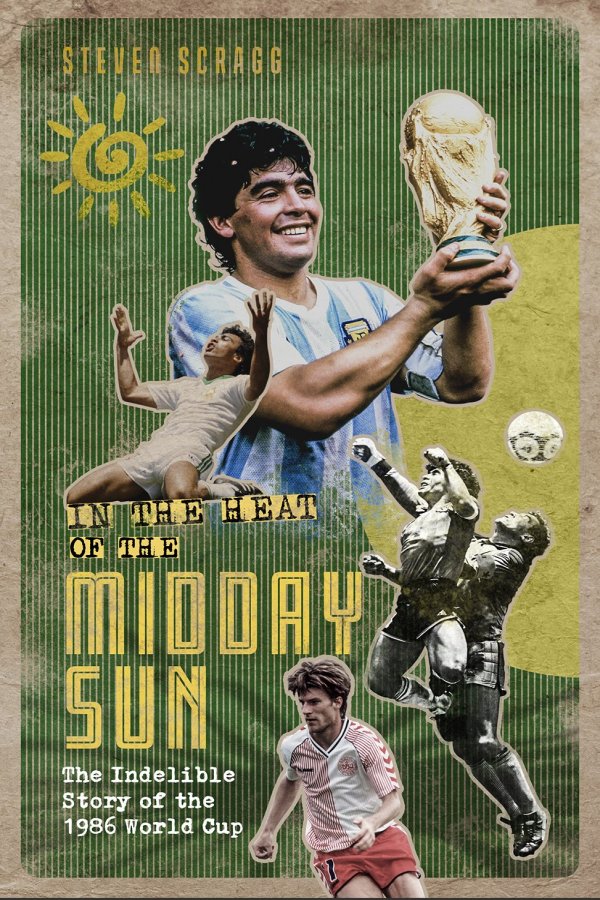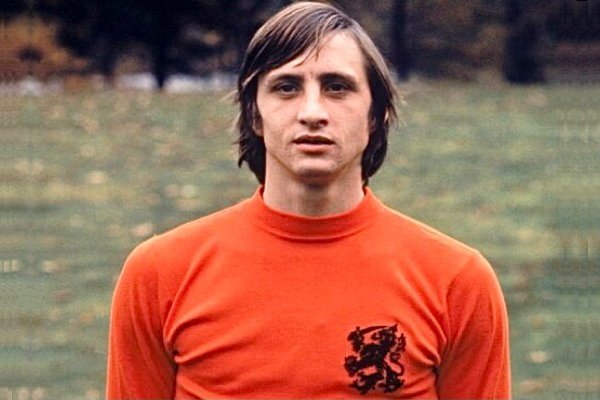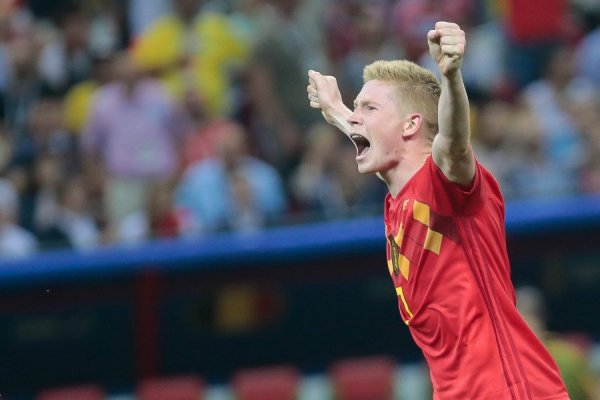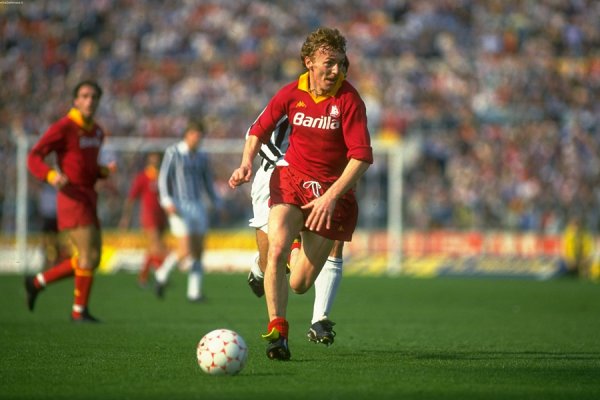My Greatest Mexico '86 XI - Steven Scragg
Steven Scragg is an award winning football author who has written a number of books on European and world football, including A Tournament Frozen in Time and Where the Cool Kids Hung Out.
His latest publication is In the Heat of the Midday Sun, documenting the Mexico'86 World Cup.
So who better to share his greatest XI from the Mexico'86 tournament...

The Starting XI (4-3-3)
GK: Joël Bats
At fault for West Germany's opening goal in the semi-final and left badly exposed for their second, up until this point it had taken the genius of Rats and Careca to breach the French goal, while he had also been the hero in the penalty shootout in the quarter-final against Brazil. Overshadowed by the spectacular nature of other goalkeepers who conceded higher quantities of goals, Bats was wonderfully consistent.
RB: Josimar
Ascended to the right-back role for Brazil due to injury to Édson, and Leandro's refusal to take part in the tournament. Making his international debut against Northern Ireland, a World Cup icon was born with that incredible goal and magnificent celebration, only to go and follow it up with another stunning strike in the last 16 against Poland.
LB: Branco
Brazil's greatest full-backs always come as a pair, and Branco's determination and drive was vital to their run to the quarter-final, and what could well have been an odyssey to the final itself, had the penalty shootout against France fallen their way. Always available and blessed with speed and power, to go along with that explosive eye for goal.
CB: Oscar Ruggeri
The cornerstone of Argentina's World Cup winning defence, before 1986 was over he would also help his club, River Plate, to glory in both the Copa Libertadores and the Intercontinental Cup. Hugely influential for Carlos Bilardo in Mexico, during a tournament where Daniel Passarella was to play no part, instead left to watch on from the sidelines. Even found the back of the net against South Korea.
CB: Andoni Goikoetxea.
Magnificently maleficent, yet so much more than the stereotypical hatchet man that his reputation deems him to be. He was key to Spain's hopes as their coach, Miguel Muñoz, juggled an injury crisis in central defence that saw Goikoetxea paired with makeshift partners Víctor and Ricardo Gallego, both midfielders. Coolly converted a penalty against Denmark, his suspension for the quarter-final proved costly.
RM: Jan Ceulemans
A magnificent visionary, but one who tends to be marginalised by other star turns with bigger egos. Skilled, and far too elegant for a player of his build, there should have been an awkward clumsiness about Jan Ceulemans, yet there was no such thing. Socks usually around his ankles, hair flowing, he defied physical gravity to play with the type of ease that allowed him to make opposing defences utterly pliable. Integral in Belgium's run to the last four.
CM: Michel Platini
So much pressure rested on his shoulders going into the 1986 World Cup and he took to the group stages with a set of selfless performances, and a magnanimous approach to perceived lesser opponents. Platini grew into the tournament through the knockout stages where he was the inspiration against Italy and his class made the difference against Brazil, despite his miss in the penalty shootout. The semi-final was a mission too far.
LM: Diego Maradona
Simply the greatest footballer of all time. Truly mesmerising throughout this tournament, he started and ended the 1986 World Cup by drawing the sting of Argentina's opponents, taking the kicks and soaking up the attention to allow his teammates to prosper. In between these games Maradona was unstoppable against Italy, Bulgaria, Uruguay, England, and Belgium, his momentum building game upon game. This was the eye of football's most skillful and volatile storm.
FW: Preben Elkjær
The free-spirited Yin to Michael Laudrup's geometric Yang for Sepp Piontek's magical, yet hopelessly flawed Danish Dynamite side. At times it was as if he barely had control of the ball, but his mastery was so complete that he was rarely in danger of wasting possession. Scorer of the only goal against Scotland, he netted a hat-trick against Uruguay, before torturing West Germany for 45 minutes and missing as many compelling chances against Spain as converted by Emilio Butragueño.
FW: Igor Belanov
A low centre of gravity, allied with a stunning thirst to attack goal directly, there was little opposing defences could do to stop Belanov when in full flight. Capable of scoring from all angles and distances, any goalkeeper that dropped their focus for a moment was punished for it. A penalty scored against Hungary, it was against Belgium in the last 16 that he did his best work, when putting a hat-trick past the vaunted Jean-Marie Pfaff. Yet, Belanov still bewilderingly ended up on the losing side as the Soviet Union went down, 4-3.
FW: Careca
Injured on the eve of the 1982 finals, Careca arrived in Mexico determined to make up for lost time. A nerve settling goal against Algeria, devastating against Northen Ireland, he applied the cherry on the cake to the demolition of a wounded and determined Poland, before sweeping that majestic goal past Joël Bats in Brazil's unrequited flirtation with a place in the semi-final. Still one of football's great imponderables as to why he didn't step up in the penalty shootout.
Substitutes
GK: Harald (Toni) Schumacher
The World Cup's traditional pantomime villain: four years on from Seville, Battiston and all that, Schumacher went on to play in his second World Cup final. You don't get to play in back-to-back World Cup finals without being a supremely talented goalkeeper and his role of football's bogeyman helped facilitate that, at a tournament where he was on his best behaviour on the pitch, yet fractious off it. Very nearly dropped by Franz Beckenbauer.
DF: Manuel Amoros
Played every minute of the tournament for France, bringing some much-needed experience and continuity from four years earlier, plus his nation's success in the 1984 European Championship. Nerveless in his dispatching of a penalty in the quarter-final shootout against Brazil and only denied a starting role in this team by the rampaging enthusiasm of Josimar.
AM: Michael Laudrup
Elkjær might have scored a hat-trick against Uruguay, but Laudrup stole the show with an incredible weaving effort that simply took the breath away. A player that could not only see all the angles on a football pitch, but one who could also invent new ones, he would drop deep, pull wide, and press high, all within a matter of seconds, this in the cloying heat and insufferable altitude of Mexico. A complete and utter genius, he was still around when Denmark reached their next World Cup, 12 years later.
FW: Emilio Butragueño
Four goals in 45 mad minutes of football against the ludicrously talented Denmark will always be the reset image of Butragueño to an entire generation of football lovers, no matter what else he did in the rest of his illustrious career. A player that could blow hot and cold, he would go on to experience a goal drought during the Euro 88 qualifiers, but in Mexico, against Denmark, every time he ventured into the penalty area a goal felt inevitable. Also scored the opener against Northern Ireland.
FW: Gary Lineker
Top scorer at the 1986 World Cup, yet the combined aggregate distance of his six goals is probably shorter than the one Vasyl Rats scored against France. The penalty box poacher's penalty box poacher of choice, Lineker's hat-trick against Poland likely saved Bobby Robson's job, while the two he snared against Paraguay showed it had been no flash in the pan. Scorer of a goal against Argentina in the quarter-final that is less spoken about that 'that' miss.

This Mexico'86 XI was selected by Steven Scragg, the author of In the Heat of Midday Sun - The Indelible Story of the 1986 World Cup.
You can find Steven on Twitter and details of where to buy his book on Pitch Publishing:
- Twitter - @Scraggy_74
Tweet



